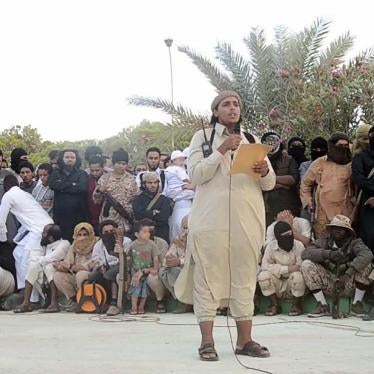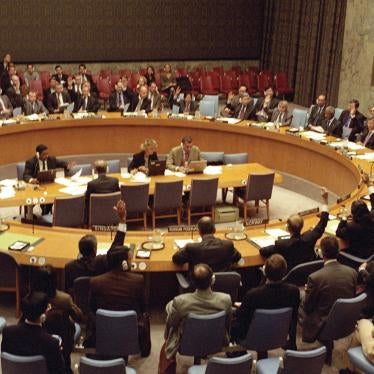(New York) - The Iranian judiciary should set aside any judgments issued in closed judicial proceedings against seven Baha'i leaders and release them immediately given that no evidence appears to have ever been presented against them, and they have not been given a fair and public trial, Human Rights Watch said today.
The authorities arrested the seven in May 2008 and severely restricted their access to lawyers and their families. Government officials reportedly informed one of their lawyers in recent days that Branch 28 of the Revolutionary Court had sentenced each of the seven to 20 years in prison on charges that include propaganda against the state and espionage.
"For more than two years now the Iranian authorities have utterly failed to provide the slightest shred of evidence indicating any basis for detaining these seven Baha'i leaders, let alone sentencing them to 20 years in prison," said Joe Stork, deputy director of the Middle East division at Human Rights Watch.
The Baha'i faith originated in Iran in the 19th century and today has approximately 300,000 followers in that country. The Iranian government considers Baha'is to be apostates from Islam and bars them from openly practicing their faith. Baha'is face discrimination in higher education and many areas of employment. Since the establishment of the Islamic Republic in 1979, security forces have arbitrarily arrested and detained hundreds of Baha'is on purported national security charges.
In the current case, security forces arrested six leaders of Iran's Baha'i community at their homes in Tehran on May 14, 2008. The six are Fariba Kamalabadi, Jamaloddin Khanjani, Afif Naeimi, Saeid Rezaie, Behrouz Tavakkoli, and Vahid Tizfahm. The authorities had arrested the seventh, Mahvash Sabet, the group's secretary, on May 5 in Mashhad, in northeast Iran, when he responded to a summons from the Intelligence Ministry.
After holding the seven in Evin Prison for 20 months without charge, on January 12, 2010, officials brought charges that included spying, "propaganda against the state," "collusion and collaboration for the purpose of endangering the national security," and "spreading corruption on earth." Authorities did not allow the five men and two women to post bail and allowed only limited visits from family members and lawyers. Their trial began January 12 and consisted of six brief closed-door hearings, the last on June 14.
Judge Mohammad Moghiseh conducted the trial at Branch 28 of the Revolutionary Court in Tehran. He also has presided over proceedings in the cases of numerous individuals unlawfully detained during peaceful protests against the results of the June 12, 2009 presidential election.
The United Nation's Office of the Baha'i International Community in Geneva reported that on August 9 authorities transferred the seven from Evin to Raja'i Shahr (also known as Gohardasht), a prison 20 kilometers west of Tehran. If true, this would suggest that they have been convicted and will serve their sentences in another prison.
Over the past two years, Human Rights Watch has repeatedly called on Iranian authorities to release the seven leaders due to government's inability or unwillingness to provide reasonable evidence warranting detention.
Government restrictions prevent Iranian Baha'is from openly practicing their faith or administering a National Spiritual Assembly, as they do in most other countries where Baha'i communities exist. Instead, Iran's Baha'is have formed an informal coordinating body known as the Friends of Iran. The seven who were detained are leaders and the secretary of this coordinating body.
The International Covenant on Civil and Political Rights, to which Iran is a party, requires Iran to ensure that everyone facing a criminal charge has a "fair and public hearing by a competent, independent and impartial tribunal" and that they have "adequate times and facilities for the preparation of their defence" and to communicate with the lawyer of their choosing.
During a review in February of its human rights record before the United Nations Human Rights Council, Mohammad Javad Larijani, the head of Iran's UN delegation, stated that "no Baha'i in Iran is prosecuted because he is a Baha'i," and the government rejected recommendations put forth by other governments calling for "an end to discrimination and incitement to hatred vis-à-vis the Baha'i."
"Iran should take concrete steps that show it is committed to protecting the fundamental rights of Baha'is," Stork said. "The immediate and unconditional release of the seven Baha'i leaders would be a good start."






